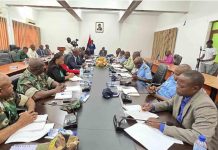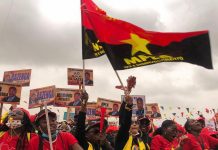Africa-Press – Angola. The national liberation struggle and the central role of Canon Manuel das Neves in Angolan nationalism was discussed this Monday in Huambo, in a lecture promoted by Edições Novembro.
The event, part of the commemorations of the 62nd anniversary of the beginning of the Armed Struggle for National Liberation, marked on the 4th of this month, took place in the auditorium of the Higher Institute of Educational Sciences (ISCED), in the presence of the governor of Huambo, Lotti Nolika, and by the chairman of the Board of Directors of Edições Novembro, Drumond Mafuta Jaime.
On the occasion, the Portuguese historian José Manuel da Silveira Lopes recalled that Canon Manuel das Neves was a Catholic priest who committed himself to the struggle for the liberation of Angola against the colonial yoke.
He said that the priest was arrested by the PIDE (then International and State Defense Police), accused of hiding the rebels who participated in the robberies of Luanda prisons, on February 4, 1961.
He added that, for the Portuguese troops, Canon Manuel das Neves, was seen as a criminal, due to the role he played during the revolt of February 4, 1961, as he maintained contacts with various nationalists, who aimed, through correspondence and other actions, the promotion of clandestine meetings for acts of rebellion in favor of the freedom of Angolans.
In turn, the governor of Huambo province, Lotti Nolika, praised the initiative of the Board of Directors of Edições Novembro, for providing young people with fundamental tools aimed at promoting the development of national history.
He said that approaching the history of the 4th of February 1961 allows one to reflect on the suffering of Angolan nationalists for the liberation of Angola against the colonial yoke.
He added that with the beginning of the Armada Struggle for National Liberation, Portuguese colonialism was forced to make profound reforms in its colonization system, with the abolition of the status of indigenato for the establishment of the contract to nationals, in addition to opening in Huambo a university center in 1964.
By the way, the chairman of the Board of Directors of Edições Novembro, Drumond Mafuta Jaime, said that the choice of Huambo resulted in the fact that it hosted the second university center in Angola, in 1964, after Luanda (1962).
He said that the event served to discuss the beginning of the Armada Struggle for National Liberation, on February 4, 1961, since there are many youth curiosities about the processes carried out by the nationalists at the time.
It was in the early hours of February 4, 1961 that a group of women and men, armed with sticks, machetes and other bladed weapons, attacked the House of Reclusion and the Prison of São Paulo, in Luanda, to free political prisoners, threatened with death. .
The 4th of February 1961 is considered an important milestone in the African struggle against colonialism, in a tradition of resistance against the occupation that came from the peoples of Kassanje, Ndongo and the Central Plateau.
The events of February 1961 thus translated into a sublime expression of nationalism, demonstrated by Angolans.
For More News And Analysis About Angola Follow Africa-Press






